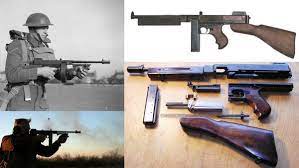
Comprehending the ATF Form 4 Transfer Approach
The National Firearms Act (NFA) was basically launched in 1934 beneath Chief professional Franklin D. Roosevelt’s management like a reply towards the development of challenging crime steps devoted with firearms. The act was implemented with the aim of regulating and manipulating the deal, acquisition, and shift of particular firearms and extras deemed too harmful for local community use. Over the years, The National Firearms Act has become susceptible to several amendments and adjustments to add a wider variety of firearms. On this page, we will jump towards the essentials of your own National Firearms Act, what it really really handles, and how it impacts tool managers and vendors over the united states of america.
1. What is the National Firearms Act?
The national firearms act (NFA) is actually a national policies that controls specific firearms and additional items that may be considered to be too unsafe or are thought army- and policies-enforcement degree. The act was released in 1934 being a legislation directed at curbing felony offenses connected with utilizing specific firearms. A few of the firearms and accessories controlled with the NFA comprise of speedy-barreled rifles, quick-barreled shotguns, unit weapons, risky merchandise, suppressors, and any other tools (AOWs).
2. NFA Regulations
Under the NFA, pistol users and retailers need to spend a taxes and publish a software about the Bureau of Alcohol, Tobacco, Firearms, and Explosives (ATF) before they can purchase, trade or produce any among the aforesaid firearms and add-ons registered through the NFA. NFA taxation are built up with the National Firearms Act Stamp (NFA Stamp), which individuals must connect to the application form kind develop well before publishing it for your ATF. Men and women also need to experience track record document investigations and deliver fingerprints within the application method. With these regulations, the NFA aspires to preserve tabs on who offers firearms and accessories that existing a substantial hazard to open public safety.
3. NFA Exemptions
Its not all the firearms and bonuses fit into the legal system within the National Firearms Act. For example, firearms that happen to be typically utilized for wearing functions, for example shotguns, rifles, and handguns, usually do not call for an NFA stamp or income tax before acquire or swap. Additionally, collectible firearms (created well before 1898) and firearms constructed for army use are also exempt within the NFA laws.
4. NFA Effect on Pistol Consumers and Dealers
The National Firearms Act directly has an effect on tool managers and merchants by regulating the purchase, possession, and transfer of certain firearms and add-ons considered to be too unsafe for open up open public use. Just before receiving any handgun licensed from the NFA, the person must distribute a software type (ATF Type 4), shell out a fees, experience fingerprinting, and continue using a in depth backdrop take a look at. Handgun sellers also have to encounter detailed National Firearms Qualification (FFL) research and comply with all government and status regulations to get qualified to promote NFA-accredited firearms and extras.
Simply Speaking:
To sum it up, The National Firearms Act is actually a federal government legislation that aims to regulate and manage the promoting, ownership, and move of numerous firearms and accessories regarded as too dangerous for available general public use. To achieve this, the NFA demands tool managers and vendors to spread a software kind (ATF Create 4), pay out a taxation, proceed through fingerprinting, and continue using an rigorous history look at. Whilst the NFA has confronted some critique throughout the years, it provides proven to be an efficient regulation in curbing the expansion of aggressive crimes connected to firearms by regulating the sale, possession, and shift of firearms and components that induce a vital threat to open public defense.